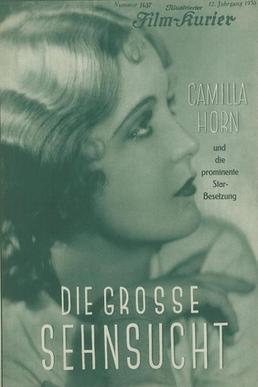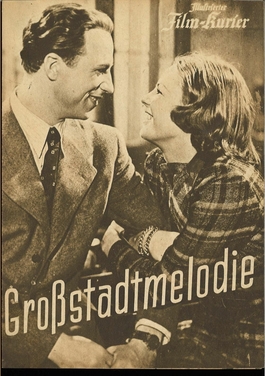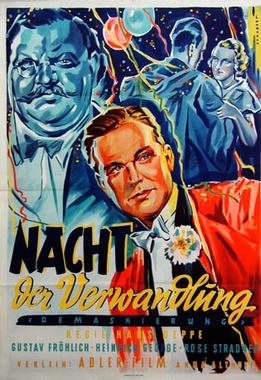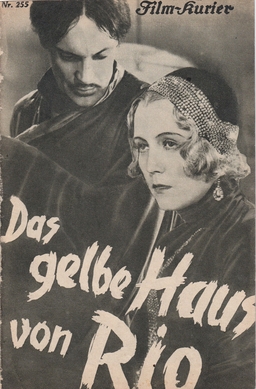
Gustav Diessl was an Austrian artist, and film and stage actor.

Gustav Friedrich Fröhlich was a German actor and film director. He landed secondary roles in a number of films and plays before landing his breakthrough role of Freder Fredersen in Fritz Lang's 1927 film Metropolis. He remained a popular film star in Germany until the 1950s.

Otto Karl Robert Wernicke was a German actor. He is best known for his role as police inspector Karl Lohmann in the two Fritz Lang films M and The Testament of Dr. Mabuse.
Eduard von Borsody was an Austrian cameraman, film editor, film director, and screenplay writer.

Under False Flag is a 1932 German spy thriller film directed by Johannes Meyer and starring Charlotte Susa, Gustav Fröhlich and Friedrich Kayssler. It was shot at the Johannisthal Studios in Berlin from the end of November 1931 to the beginning of 1932. It was made by Deutsche Universal, the German branch of Universal Pictures, in co-production with Tobis Film. The film's sets were designed by the art director Otto Hunte. It premiered at Berlin's Ufa-Palast am Zoo. The film was based on the novel of the same title by Max W. Kimmich, who also worked on the screenplay.

The Great Longing is a 1930 German comedy film directed by Steve Sekely in his directorial debut and starring Camilla Horn, Theodor Loos, and Harry Frank. It was shot at the EFA Studios in Berlin. The film's sets were designed by the art directors Hans Sohnle and Otto Erdmann. It was distributed by the German branch of Universal Pictures.

Uncle Bräsig is a 1936 German historical comedy film directed by Erich Waschneck and starring Otto Wernicke, Heinrich Schroth and Harry Hardt. It marked the film debut of the Swedish actress Kristina Söderbaum who went on to be a major star of Nazi cinema. Söderbaum won her part in a contest organised by UFA. It was based on the 1862 novel From My Farming Days by Fritz Reuter. The film was shot at the Grunewald Studios in Berlin with sets designed by the art director Robert A. Dietrich.

Maria Matray was a German screenwriter and film actress. Matray became a star of late Weimar cinema.

Melody of a Great City is a 1943 musical drama film directed by Wolfgang Liebeneiner and starring Hilde Krahl, Werner Hinz and Karl John. A young woman moves to Berlin to work as a press photographer.

Clarissa is a 1941 German romance film directed by Gerhard Lamprecht and starring Sybille Schmitz, Gustav Fröhlich and Gustav Diessl. Schmitz plays the domineering manager of a bank who eventually falls in love with one of the other employees.

The Four Musketeers is a 1934 German drama film directed by Heinz Paul and starring Fritz Kampers, Paul Westermeier and Erhard Siedel. It was shot at the Terra Studios in Berlin. The film's art direction was by Robert A. Dietrich.

The Big Bluff is a 1933 German comedy film directed by Georg Jacoby and starring Lee Parry, Betty Amann, and Harald Paulsen. It was shot at the EFA Studios in Berlin. The film's sets were designed by the art director Erich Czerwonski.

Retreat on the Rhine is a 1930 German musical comedy film directed by Jaap Speyer and starring Charlotte Susa, Hans Stüwe, and Hermann Böttcher. It was made as an operetta film which emerged as a popular genre following the arrival of sound film.

The Appeal to Conscience is a 1949 German mystery film directed by Karl Anton and starring Karl Ludwig Diehl, Werner Hinz and Gustav Diessl. It was originally shot in 1944, but remained uncompleted until it was finished by DEFA in the post-war era. It remained unreleased until it was given a 1949 premiere in Austria. Subsequently it was distributed in East Germany in 1950 and West Germany in 1951.

Men Are That Way is a 1939 German drama film directed by Arthur Maria Rabenalt and starring Hertha Feiler, Hans Söhnker and Hans Olden. The film's sets were designed by the art director Willi Herrmann. It was remade by Rabenalt in Austria as Arena of Fear (1959).

A Night of Change is a 1935 German drama film directed by Hans Deppe and starring Gustav Fröhlich, Heinrich George, and Rose Stradner. It was made at the Grunewald Studios in Berlin. The film's sets were designed by the art director Fritz Maurischat and Karl Weber.

Moscow–Shanghai is a 1936 German drama film directed by Paul Wegener and starring Pola Negri, Gustav Diessl and Susi Lanner. It was shot at the Babelsberg Studios in Berlin. The film's sets were designed by the art director Alfred Bütow and Willi Herrmann.

A Woman Branded or Dangers of Love is a 1931 German drama film directed by Eugen Thiele and starring Toni van Eyck, Elsa Bassermann and Hans Stüwe. It was shot at the Terra Studios in Berlin. The film's sets were designed by the art director Heinrich Richter.

The Love of the Maharaja is a 1936 German drama film directed by Arthur Maria Rabenalt and starring Gustav Diessl, Attila Hörbiger and Hilde von Stolz. It was made as a co-production between the Italian Astra Film and the Munich-based Bavaria Film. A separate Italian version A Woman Between Two Worlds was also produced.

The Yellow House of Rio or The Yellow House of King-Fu is a 1931 French-German crime thriller film directed by Karl Grune and starring Charlotte Susa, Gustav Diessl and Karl Günther. The film was based on a novel of the same title by Josef M. Velter. It was shot at the Joinville Studios of Pathé in a co-production with Bavaria Film. The film's sets were designed by the art directors Otto Erdmann and Hans Sohnle. Separate German French-language versions were produced, the latter directed by Grune and Robert Péguy and featuring Renée Héribel and Charles Vanel. The German version was originally also planned to be released as The Yellow House of Rio, but to avoid confusion with another film released at the same time Road to Rio, it was retitled.



















